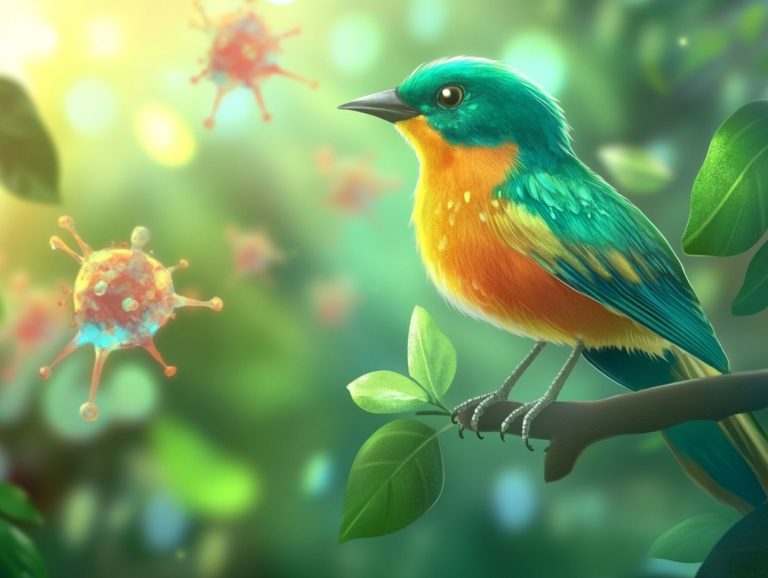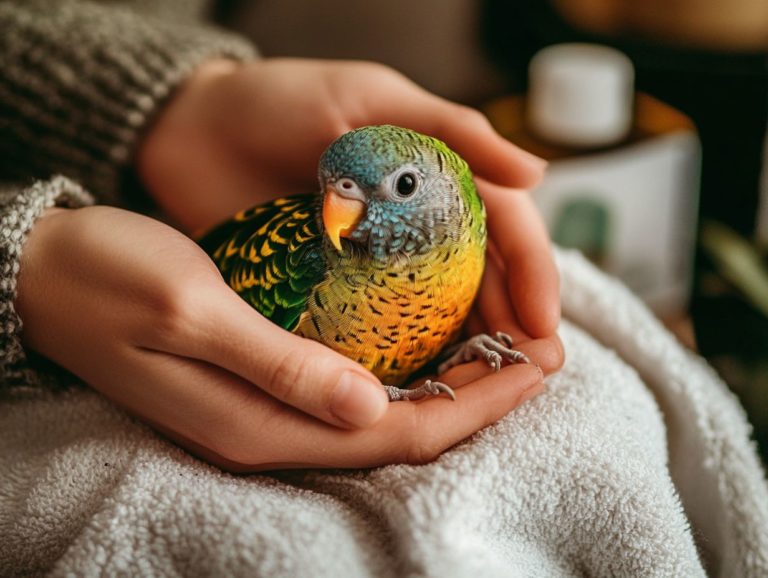Preventative Care Tips for Your Pet Bird
Caring for a pet bird transcends the basic necessities of food and shelter; it requires a genuine commitment to their overall well-being through thorough preventative care.
This guide delves into the essential elements of crafting a healthy environment for your feathered companion. We’ll cover everything from optimal cage setup and nutritional diets to encouraging regular exercise and mental stimulation.
You ll also learn how to identify signs of illness, recognize when it’s time to seek veterinary attention, and implement preventative measures tailored to various bird species.
Arming yourself with this knowledge will empower you to keep your pet bird thriving and content.
Contents
Key Takeaways:
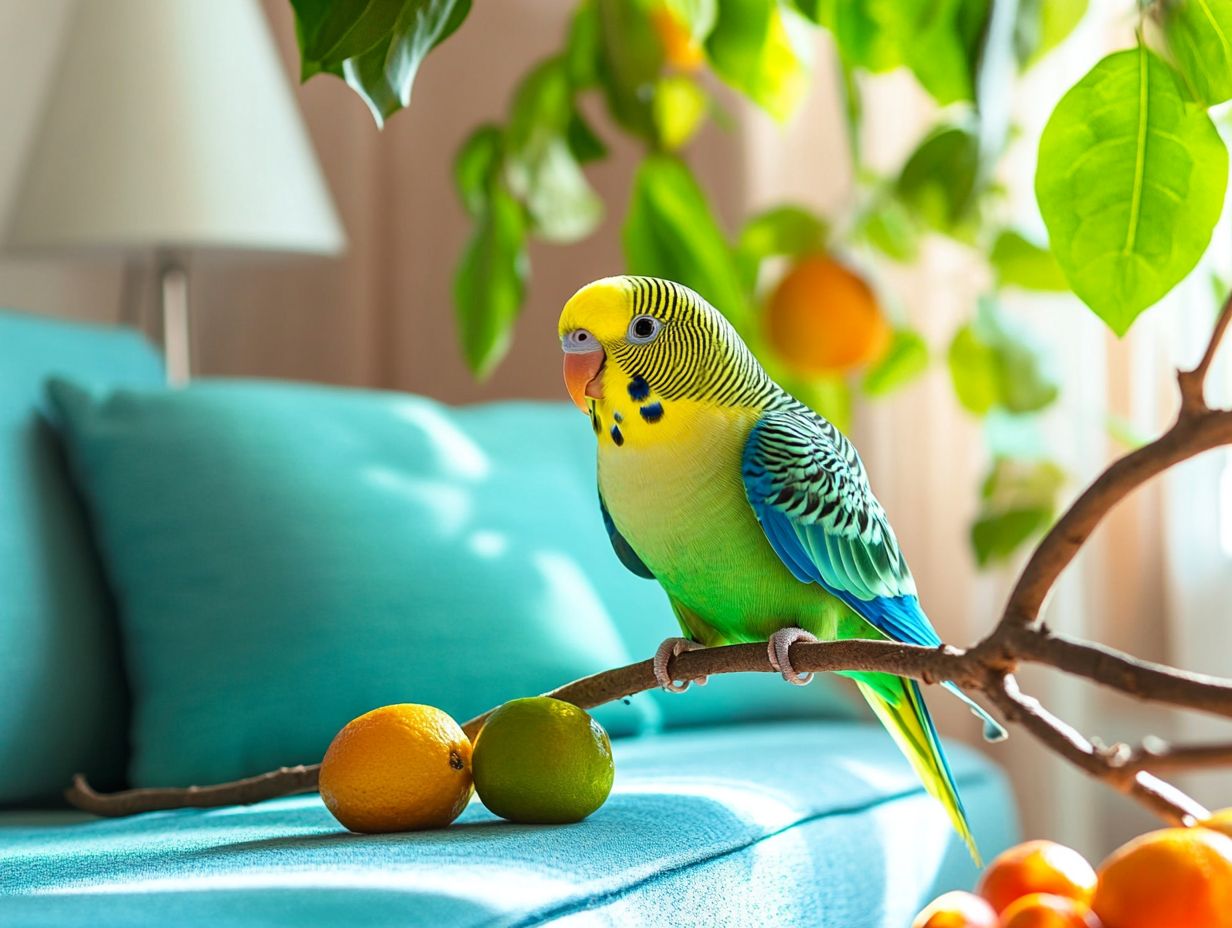
- Creating a healthy environment is crucial for your pet bird’s well-being. Proper cage setup, a nutritious diet, and regular exercise and mental stimulation are key factors for their overall health.
- Be aware of common signs of illness in pet birds and know when to seek veterinary care. Early detection and treatment can prevent serious health issues.
- Each species of bird may have unique considerations for preventative care. Research and consult with your bird veterinarian for specific tips for your pet bird’s breed.
Why is Preventative Care Important for Pet Birds?
Preventative care is essential for your pet birds, enhancing their overall well-being while helping to stave off potential health issues that can arise from neglect. Additionally, following tips for bird care in small apartments can create a comfortable environment for them. Regular health check-ups with a bird veterinarian allow you to uncover any underlying problems, ensuring your feathered companions remain both happy and healthy.
Focusing on preventative measures can dramatically lower the risk of diseases that can transfer from birds to humans, along with ailments like Aspergillosis or Chlamydophila that commonly affect pet birds.
This proactive approach enables you to spot early signs of behavioral changes that might signal distress or illness. For instance, if you notice a sudden change in vocalization or a dip in activity, it could indicate health issues that, when addressed quickly, can lead to better outcomes.
Consistent wellness tips from veterinarians help maintain your bird’s health and can also translate into significant savings on veterinary bills over time. Investing in regular check-ups is often far less expensive than dealing with complex issues stemming from untreated conditions, making preventative care an invaluable aspect of responsible pet ownership.
Creating a Healthy Environment for Your Pet Bird
Creating a healthy environment for your pet bird is essential for nurturing their well-being and preventing common behavioral issues. Adhering to proper cage specifications and maintaining a regular cleaning routine are vital for ensuring your feathered companion flourishes in their home.
By providing environmental enrichment with stimulating toys and safe perches, you can actively encourage positive behaviors and enhance their overall health and happiness.
Proper Cage Set-Up and Maintenance
Proper cage setup and maintenance are vital for the well-being of your pet bird, ensuring they enjoy a safe and comfortable living space. A well-maintained cage not only helps prevent health issues but also fosters positive behaviors in your feathered companion.
Make sure the cage is adequately sized for your bird’s species, allowing ample space for flight and play. Opt for sturdy materials, like powder-coated metal, to ensure durability and safety while steering clear of harmful plastics or treated woods.
Position the cage in a quiet area of your home, away from drafts and direct sunlight, to minimize stress. Establishing a cleaning schedule is crucial; it helps eliminate dropped food, waste, and other debris, preventing harmful bacteria and ensuring a pleasant atmosphere for your avian friend.
Investing time in these maintenance tasks significantly enhances your pet’s overall happiness and health.
Conclusion
In summary, taking care of your pet bird requires a commitment to preventative measures, proper cage setup, and regular health check-ups. Start implementing these essential tips today to enhance your pet bird’s health and happiness!
Safe and Nutritious Diet
A safe and nutritious diet is crucial for your pet bird’s health. It ensures vibrant, healthy feathers.
As a dedicated pet parent, you should prioritize balanced diets tailored to the unique needs of various species. Whether you have parrots or popular pet birds like budgies and cockatiels, establishing a consistent feeding schedule can significantly enhance your feathered friend s overall well-being.
Recognizing that each species has distinct dietary requirements is essential. For example, while parrots do well on a varied diet brimming with nuts, seeds, and fruits, budgies thrive on a high-quality pellet mix enhanced with fresh vegetables.
The misconception that seeds alone are enough can lead to not getting enough nutrients. This impacts feather quality and overall health. To promote optimal feather health, it s vital to incorporate a diverse array of foods and eliminate harmful items, such as avocado or chocolate.
By regularly monitoring your bird s eating habits, you can spot any potential issues early. This ensures your companion remains happy and healthy.
Regular Exercise and Mental Stimulation
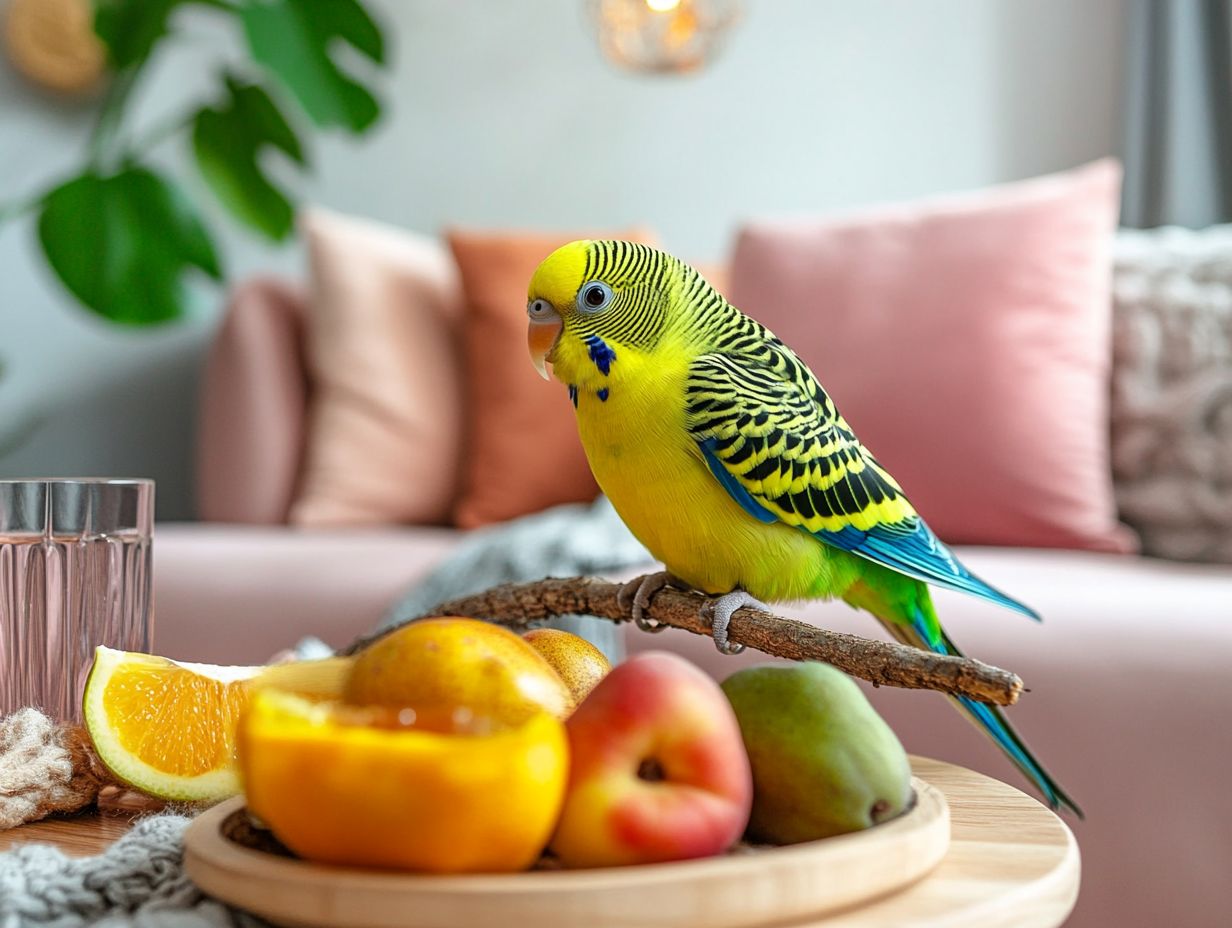
Regular exercise and mental stimulation are essential for keeping your pet bird both physically active and mentally sharp.
Incorporating a variety of activities fulfills their physical needs and nurtures their emotional well-being. Engaging with toys think puzzles and foraging items invites your bird to explore while sparking their problem-solving instincts.
Setting aside dedicated time for one-on-one sessions, whether through gentle training or simply chatting, greatly enhances their socialization skills. Birds thrive on companionship, and a vibrant environment filled with diverse activities allows them to develop their natural instincts.
This leads to a happier and more fulfilled life. By observing the subtle nuances in their behaviors, you can gain valuable insights into their preferences. This enables you to continuously adapt your interactive playtime for maximum enjoyment.
Signs of Illness in Pet Birds
Recognizing the signs of illness in your pet bird is essential! This ensures timely intervention and effective treatment.
Remain vigilant for common symptoms such as changes in appetite, lethargy, or shifts in behavior. These may signal underlying health issues.
Prompt detection increases the likelihood of a successful recovery. Paying close attention to your feathered friend is key to their well-being.
Common Symptoms to Watch For
Be on the lookout for common symptoms in your pet birds, such as changes in appetite, unusual vocalizations, and signs of distress. These may signal potential health issues.
Familiarizing yourself with these behavioral cues enables you to act swiftly if your feathered friends exhibit any concerning changes. Additionally, pay close attention to any shifts in feather appearance. Dullness or excessive molting might indicate nutritional deficiencies or stress.
Monitor their drinking habits too; a sudden increase or decrease could point to underlying health concerns like dehydration or kidney problems. Mobility is another critical aspect. If you notice difficulty in movement or sudden lethargy, it may suggest an injury or illness.
By staying vigilant about these symptoms and grasping their potential implications, you can proactively address your birds wellness. This ensures a happier and healthier life for your cherished companions.
When to Seek Veterinary Care
Understanding when to seek veterinary care for your pet bird is crucial for ensuring their health and well-being. If you notice any significant behavioral changes or persistent symptoms, consulting with a bird doctor becomes imperative. This means your bird gets the right treatment without delay.
Certain signs like difficulty breathing, a diminished appetite, or unusual feather loss should raise immediate red flags. It’s essential to be aware of these indicators, as taking swift action can often lead to vastly improved outcomes.
During a typical veterinary check-up, you can anticipate a comprehensive physical examination. The vet will evaluate everything from your bird’s weight to the quality of its plumage. Regular health checks are important for spotting problems early.
This proactive approach allows for preventative measures that can significantly elevate your bird’s quality of life.
Preventative Care Tips for Specific Types of Pet Birds
Preventative care tips tailored to your specific type of pet bird can significantly enhance its quality of life and longevity. Understanding the importance of regular vet visits for birds is crucial, as each species—be it parrots, budgies, or cockatiels—comes with unique needs that demand personalized approaches to care.
By engaging with a bird doctor like Dr. Linda Simon, you can gain valuable insights into effective species-specific care that perfectly meets your bird s individual requirements.
Special Considerations for Different Species
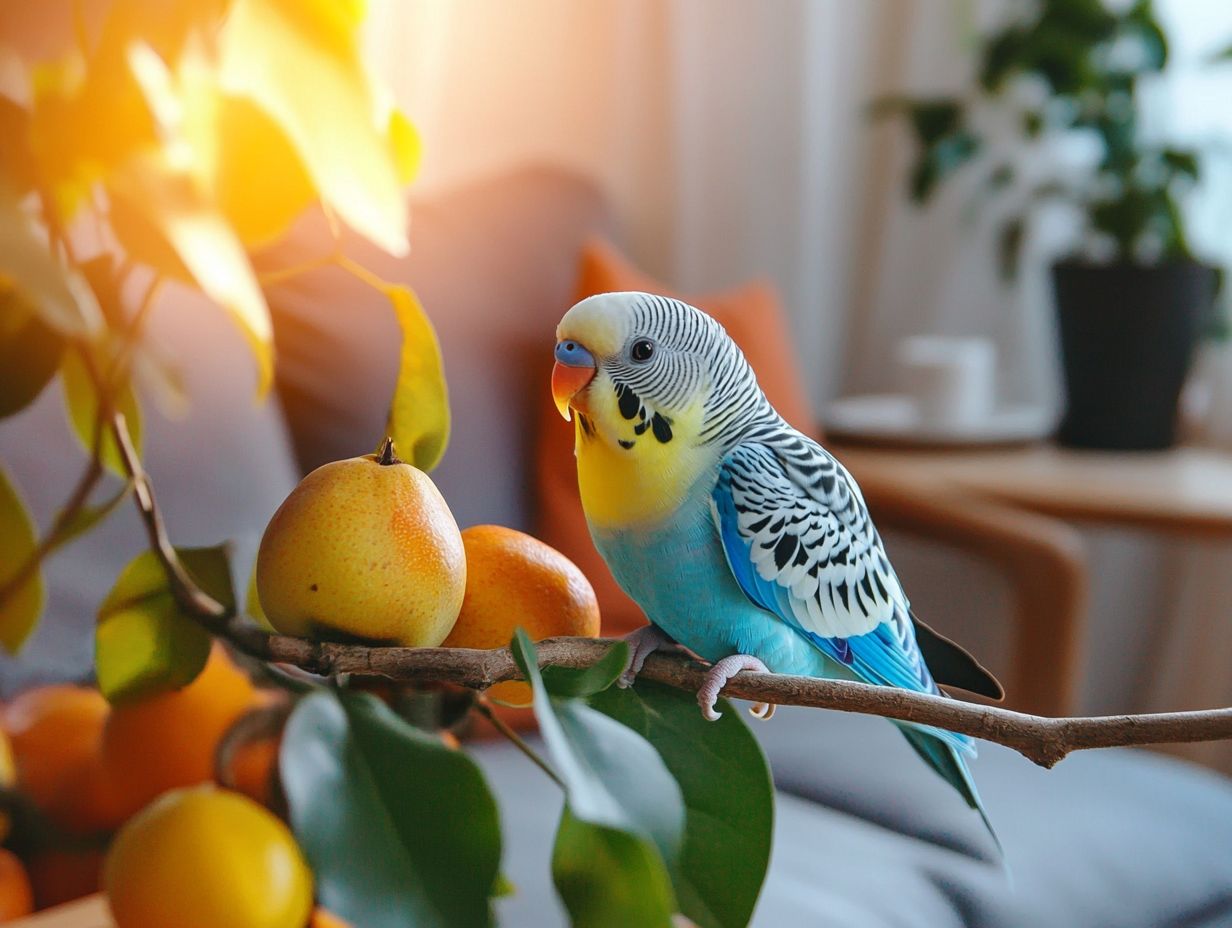
Special considerations in species care are vital for ensuring the health and happiness of your pet birds, whether you have macaws, cockatiels, or others.
These feathered friends come with diverse dietary needs that must be met to keep them vibrant and thriving. For example, your macaws will flourish on a diet rich in a variety of fruits, nuts, and specially formulated pellets, while cockatiels thrive on a mix of seeds paired with fresh vegetables.
Understanding nutrition for parrots can further enhance their good health.
Social interactions are equally crucial. Many birds are natural flock animals and can develop behavioral issues if left alone for too long. It s essential for you to create an environment that caters to their social needs and engage with them regularly.
By tailoring care to meet their specific environmental and emotional requirements, you not only promote their well-being but also help prevent potential health problems.
Regular Check-Ups and Veterinary Care
Regular check-ups and veterinary care are essential practices for maintaining your pet bird‘s health. They allow you to catch any potential issues early, including behavioral issues.
Scheduling annual exams helps ensure your bird stays healthy. You also equip yourself with important information about necessary vaccinations and health precautions.
This proactive approach is key to giving your feathered companion the best possible care and helps you understand their daily routine.
Importance of Annual Exams and Vaccinations
Annual exams and vaccinations are vital parts of veterinary care that help prevent diseases in your pet birds. Scheduling regular check-ups with a bird doctor allows you to monitor your bird s health trends and ensures they receive vaccinations against common diseases that could impact various species.
These vaccinations are crucial! They help keep your feathered friend safe from serious diseases like psittacosis a disease that can affect parrots and other birds avian influenza, and polyoma virus, all of which can wreak havoc without timely intervention.
By making sure your pet receives these essential immunizations, you enhance their chances of enjoying a long and healthy life.
During these annual exams, you can expect thorough evaluations, including weight checks, assessments of feather condition, and diagnostic tests aimed at catching any underlying issues early. Cultivating a relationship with a bird doctor not only protects against illness but also elevates the overall well-being of your feathered companions.
Preventative Measures for Common Health Issues in Pet Birds
Implementing preventative measures for common health issues in pet birds is crucial for ensuring their longevity and happiness. From controlling parasites to recognizing the triggers behind behavioral issues, you must take proactive steps to safeguard your feathered companions from a range of health concerns. Let s keep your feathered friends happy and healthy!
Preventing Infections, Parasites, and Other Health Concerns
Preventing infections and parasites is a vital part of caring for your pet bird, directly influencing their health and happiness. Keep your bird’s living space clean to lower infection risks.
Additionally, a solid understanding of zoonotic diseases diseases that can spread between animals and humans not only protects your feathered friend but also keeps you safe.
Regularly disinfecting cages, toys, and perches is crucial; it eliminates potential germs lurking in these areas. Provide a balanced diet rich in vitamins. This boosts your bird’s immune system, making them less vulnerable to various ailments.
Staying vigilant about environmental factors like humidity and temperature also plays a key role in their overall well-being. It’s also vital for bird owners to understand common zoonotic diseases that can pass from pets to humans, ensuring a healthy and safe space for both your pet and your family.
Frequently Asked Questions
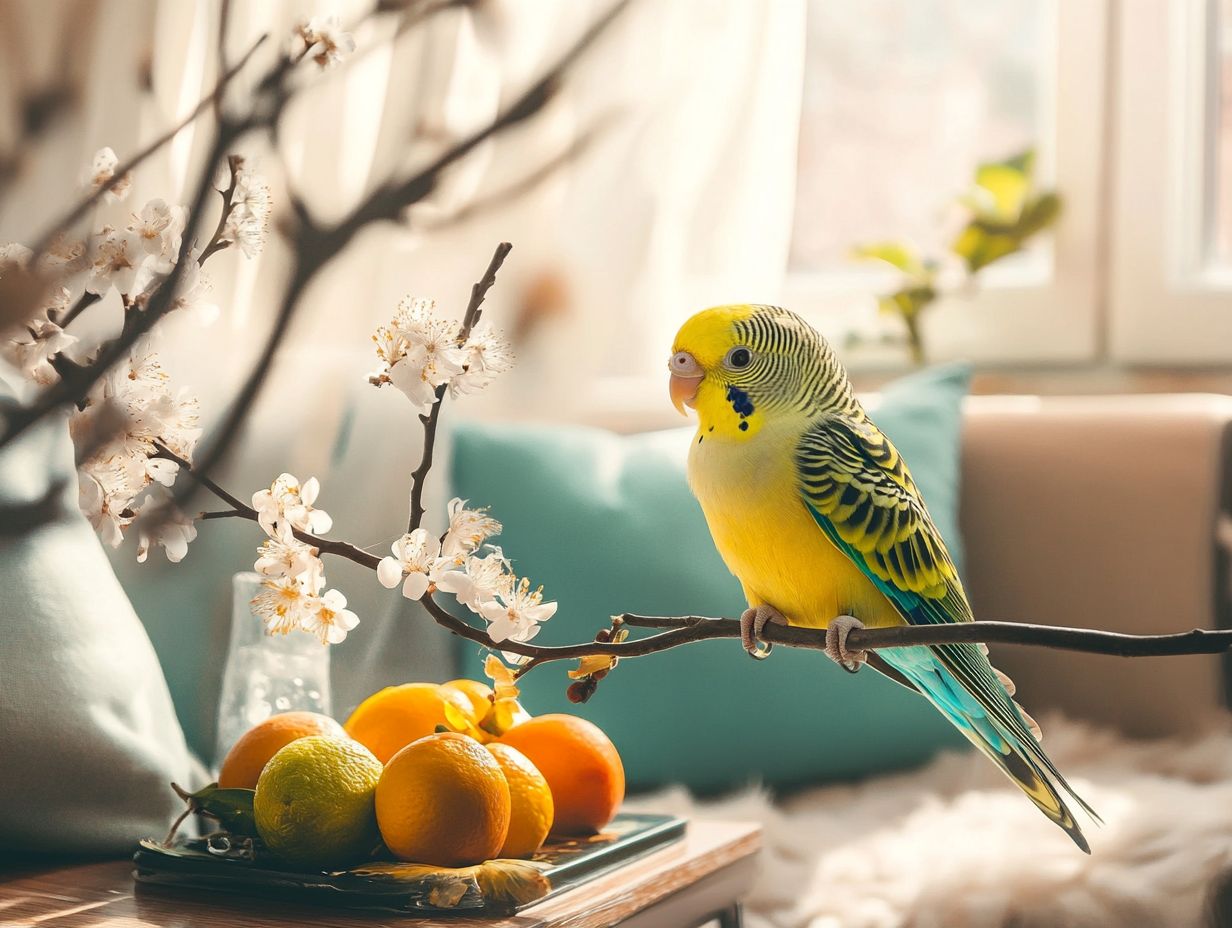
What are some basic preventative care tips for my pet bird?
Some basic preventative care tips for your pet bird include regular cleaning tasks for the cage, providing a balanced and nutritious diet for birds, and ensuring your bird receives enough social interaction and physical stimulation. Additionally, consider following seasonal health tips for your pet bird to keep them healthy year-round.
How often should I take my bird to the veterinarian for check-ups?
It is recommended to take your bird to the avian vet for a health check at least once a year, but more frequent visits may be necessary for younger or older birds or those with preexisting health conditions! Regular vet visits are essential!
What vaccinations does my pet bird need?
Pet birds do not require vaccinations like cats and dogs, but it is still important to have your bird examined by a veterinarian regularly to ensure their overall health and to discuss pet insurance options.
What are some signs that my bird may be sick?
Some common signs of illness in birds include changes in behavior, weight loss, feather plucking, and discharge from the eyes or nostrils. If you notice any of these symptoms, it is important to take your bird to the veterinarian for a check-up.
Should I clip my bird’s wings?
It is a personal preference whether or not to clip your bird’s wings. Some owners choose to do so for safety reasons, while others believe it is important for their bird’s physical and mental health to be able to fly. Consult with your veterinarian to determine the best option for your specific bird.
How can I prevent my bird from getting sick?
To prevent your bird from getting sick, keep their environment clean, provide them with a healthy diet, and regularly monitor their behavior and physical appearance for any changes. Additionally, avoid exposing your bird to other sick birds and ensure they receive proper veterinary care when needed.

